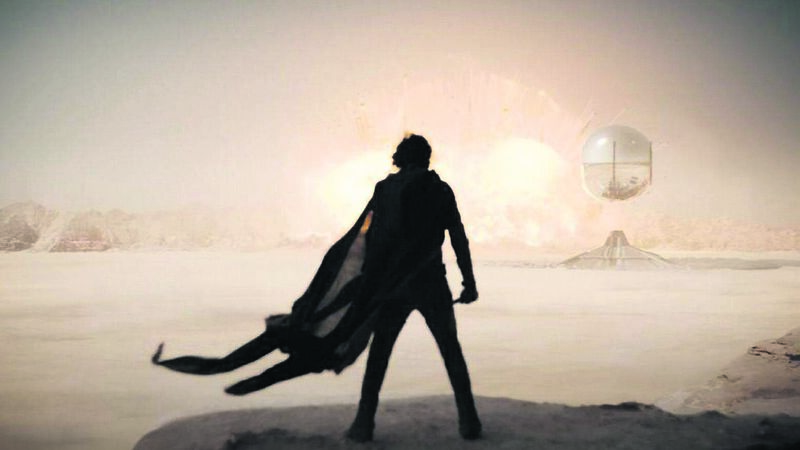Film Review: Almost flawless, Dune is a delight

Paul Atreides (Timothée Chalamet), in Dune: Part Two, in cinemas on March 1.
DENIS Villeneuve’s 2021 epic Dune is a jaw-dropping film. His take on Frank Herbert’s 1965 novel made more than $400 million at the box office, huge considering the pandemic was still affecting cinema attendance.
It won six Oscars, disproving the belief that a successful screen adaptation of Dune was impossible. It just needed the right director.
Villeneuve, the visionary director behind Sicario and Arrival, was dedicated to bringing his favourite book to life and doing justice to the scale of the story. It got five stars from me and my expectations for Dune: Part Two were high.
In part one, the great House of Atreides had fallen, betrayed by the Harkonnens led by the dictatorial Baron (Stellan Skarsgård).
As far as the other houses were concerned, there were no survivors of the massacre.
However, we know that Paul Atreides (Timothée Chalamet), the Atreides heir, and his mother, Lady Jessica (Rebecca Ferguson), survived.
They now live with the Fremen, the rebel fighters of the sand-covered Arrakis. The Fremen have been suppressed and enslaved for decades, but the warriors are fierce and dead set on gaining their freedom.
Paul and Lady Jessica earned the trust of the Fremen’s lead warrior, Stilgar (Javier Bardem), but they still have to prove themselves. Paul accepts that Arrakis is his new home and wants to become a Fremen, but there are many skills to learn. He will either succeed or die trying.
Paul experienced visions in the first film, which continue now that they are in Arrakis. His mother, a member of the elite group of magicians, the Bene Gesserit, passionately believes that her son is destined for greater things.
The Fremen are deeply religious and believe in a prophecy that says a messiah will come to them in their darkest days.
Stilgar thinks that Paul is the messiah and sets out to prove it to non-believers, while Lady Jessica becomes more involved with the religious zealots to help Paul reach his destiny.
Chani (Zendaya), the young warrior Paul fell for in the first film, does not believe in her people’s religion. She accepts that Paul is special and may have the skill to help them, but she thinks the messiah was made up to suppress the Fremen.
Chani sees it as her job to keep Paul grounded and stop his ego growing with all the messiah talk. She loves him deeply, and the young lovers share some tender moments amidst the violence and danger they face.
In another world, a new family is introduced. Princess Irulan (Florence Pugh) and her father, the emperor (Christopher Walken), are shaken by the fall-out from the genocide against the Atreides. The emperor refuses to talk, and the princess has to step up. She turns to the Bene Gesserit for advice, but they are a shady lot. Who knows if they can really be trusted?
Can any of the remaining houses be trusted?
If we thought Baron Harkonnen was vile in the first film, he has nothing on his psychotic nephew Feyd-Rautha (Austin Butler). He kills people on a whim and desperately wants to please his cruel uncle.
The characters are gradually brought together, but can Paul avenge his family and lead the Fremen without becoming power-hungry? Can Chania keep him grounded? And can an old mentor, Gurney Halleck (Josh Brolin), remind Paul what his father, the noble Duke Leto, stood for?
Dune: Part Two is a staggering piece of filmmaking. Villeneuve has created something rich in spectacle and scale that harks back to the great sweeping epics of the 1960s but with a 21st-century vision.
As the film entered its third act, I watched in awe, my heartbeat pulsing in my ears.
The final scene leaves room for a third film, but if part three isn’t green lit, the ambiguity in the last moments is a fitting way to end it all.
As I sat there, rattled and a little dumbstruck, I was left with an overwhelming sense of déjà vu, which brought me back to the Oppenheimer press screening last year. Despite having so many perfect elements, one jarring flaw would deprive the film of five stars.
Dune: Part Two, like Oppenheimer, is so close to being a masterpiece, but it is also flawed.
While individually superb, the scenes in the first half jump from one to the next with jarring brevity.
Dune: Part One was perfection, and I wanted Part Two to equal, if not emulate it. Dune’s lesson is that there is no such thing as a perfect person; I guess that goes for most films, too.
Dune: Part Two, in cinemas, Mar 1, cert 12a, ****







